International Relations Theories: Realism, Liberalism, and Beyond
VerifiedAdded on 2020/03/07
|6
|1257
|47
Essay
AI Summary
This essay provides an overview of key theories in International Relations, including realism, liberalism, constructivism, Marxism, environmentalism, and feminism. It explains how these theories attempt to explain the international system and the actions of nations. The essay highlights realism's focus on national power, liberalism's emphasis on international cooperation and law, and constructivism's focus on social norms and identities. It also discusses the role of the United Nations and the global economy within a liberal framework, emphasizing the importance of international relations for fostering peace, trade, and sustainable practices. The essay concludes by advocating for nations to adopt fair theories to ensure the best outcomes for their citizens and maintain positive international relations. The essay also includes references to support the discussed theories.
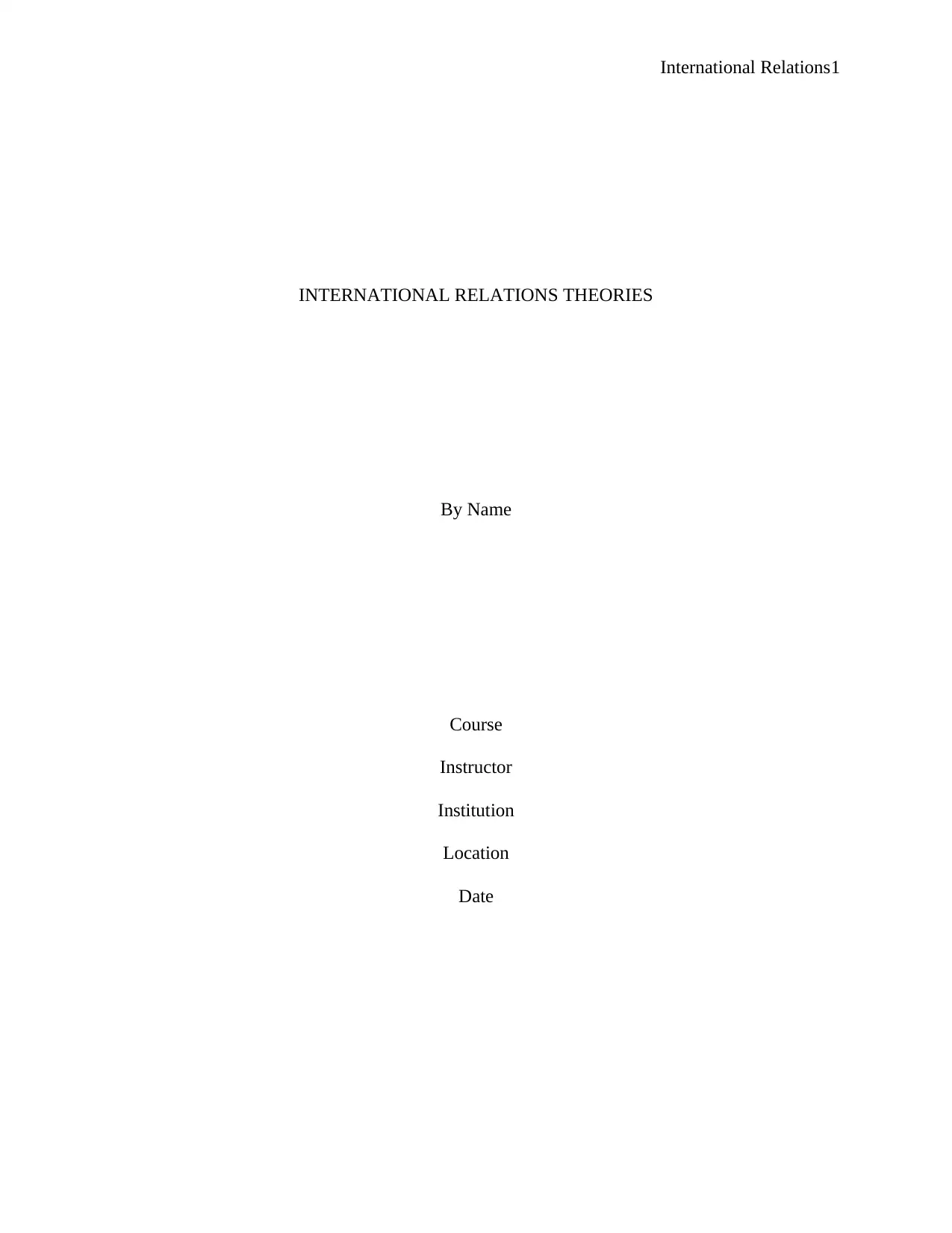
International Relations1
INTERNATIONAL RELATIONS THEORIES
By Name
Course
Instructor
Institution
Location
Date
INTERNATIONAL RELATIONS THEORIES
By Name
Course
Instructor
Institution
Location
Date
Paraphrase This Document
Need a fresh take? Get an instant paraphrase of this document with our AI Paraphraser
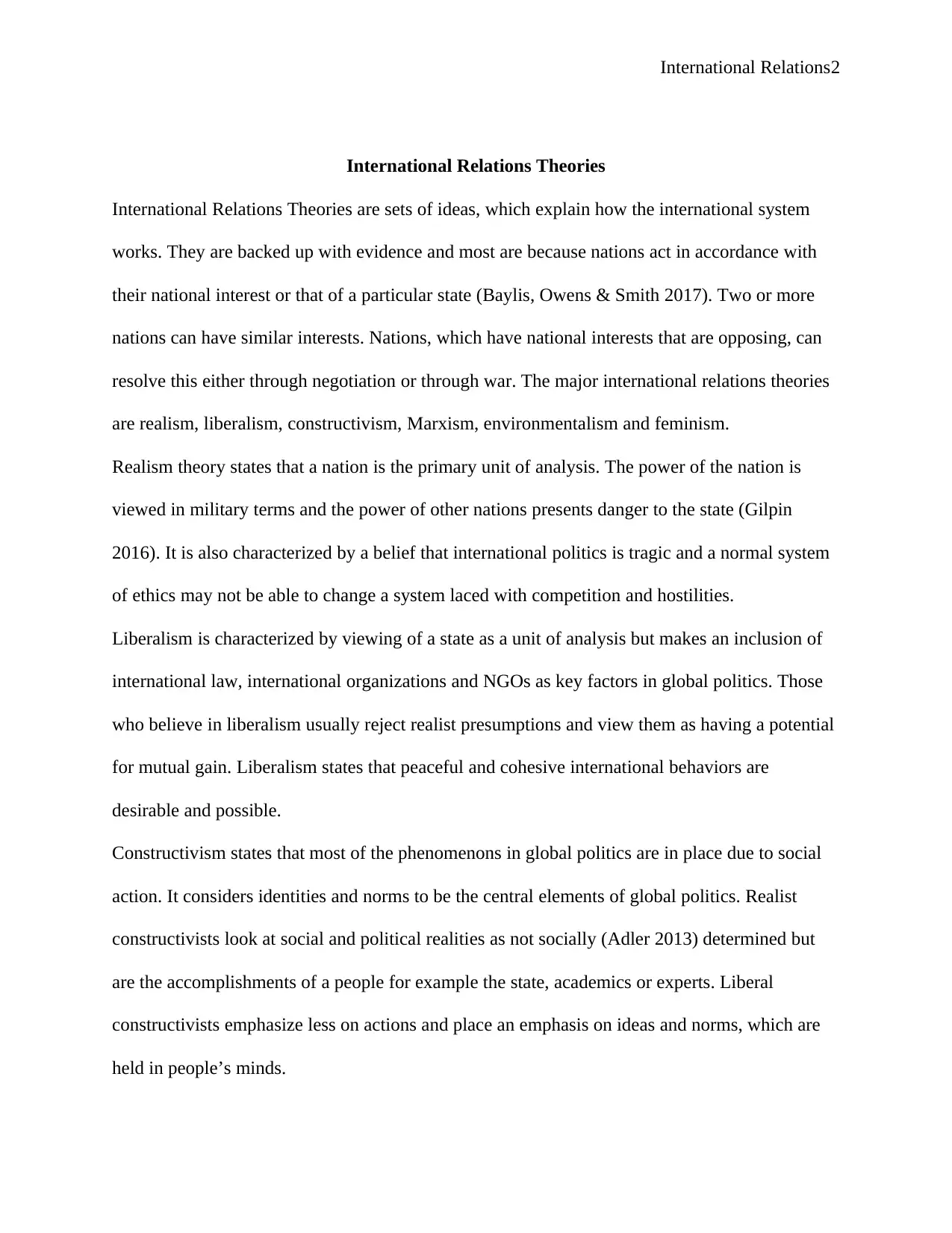
International Relations2
International Relations Theories
International Relations Theories are sets of ideas, which explain how the international system
works. They are backed up with evidence and most are because nations act in accordance with
their national interest or that of a particular state (Baylis, Owens & Smith 2017). Two or more
nations can have similar interests. Nations, which have national interests that are opposing, can
resolve this either through negotiation or through war. The major international relations theories
are realism, liberalism, constructivism, Marxism, environmentalism and feminism.
Realism theory states that a nation is the primary unit of analysis. The power of the nation is
viewed in military terms and the power of other nations presents danger to the state (Gilpin
2016). It is also characterized by a belief that international politics is tragic and a normal system
of ethics may not be able to change a system laced with competition and hostilities.
Liberalism is characterized by viewing of a state as a unit of analysis but makes an inclusion of
international law, international organizations and NGOs as key factors in global politics. Those
who believe in liberalism usually reject realist presumptions and view them as having a potential
for mutual gain. Liberalism states that peaceful and cohesive international behaviors are
desirable and possible.
Constructivism states that most of the phenomenons in global politics are in place due to social
action. It considers identities and norms to be the central elements of global politics. Realist
constructivists look at social and political realities as not socially (Adler 2013) determined but
are the accomplishments of a people for example the state, academics or experts. Liberal
constructivists emphasize less on actions and place an emphasis on ideas and norms, which are
held in people’s minds.
International Relations Theories
International Relations Theories are sets of ideas, which explain how the international system
works. They are backed up with evidence and most are because nations act in accordance with
their national interest or that of a particular state (Baylis, Owens & Smith 2017). Two or more
nations can have similar interests. Nations, which have national interests that are opposing, can
resolve this either through negotiation or through war. The major international relations theories
are realism, liberalism, constructivism, Marxism, environmentalism and feminism.
Realism theory states that a nation is the primary unit of analysis. The power of the nation is
viewed in military terms and the power of other nations presents danger to the state (Gilpin
2016). It is also characterized by a belief that international politics is tragic and a normal system
of ethics may not be able to change a system laced with competition and hostilities.
Liberalism is characterized by viewing of a state as a unit of analysis but makes an inclusion of
international law, international organizations and NGOs as key factors in global politics. Those
who believe in liberalism usually reject realist presumptions and view them as having a potential
for mutual gain. Liberalism states that peaceful and cohesive international behaviors are
desirable and possible.
Constructivism states that most of the phenomenons in global politics are in place due to social
action. It considers identities and norms to be the central elements of global politics. Realist
constructivists look at social and political realities as not socially (Adler 2013) determined but
are the accomplishments of a people for example the state, academics or experts. Liberal
constructivists emphasize less on actions and place an emphasis on ideas and norms, which are
held in people’s minds.
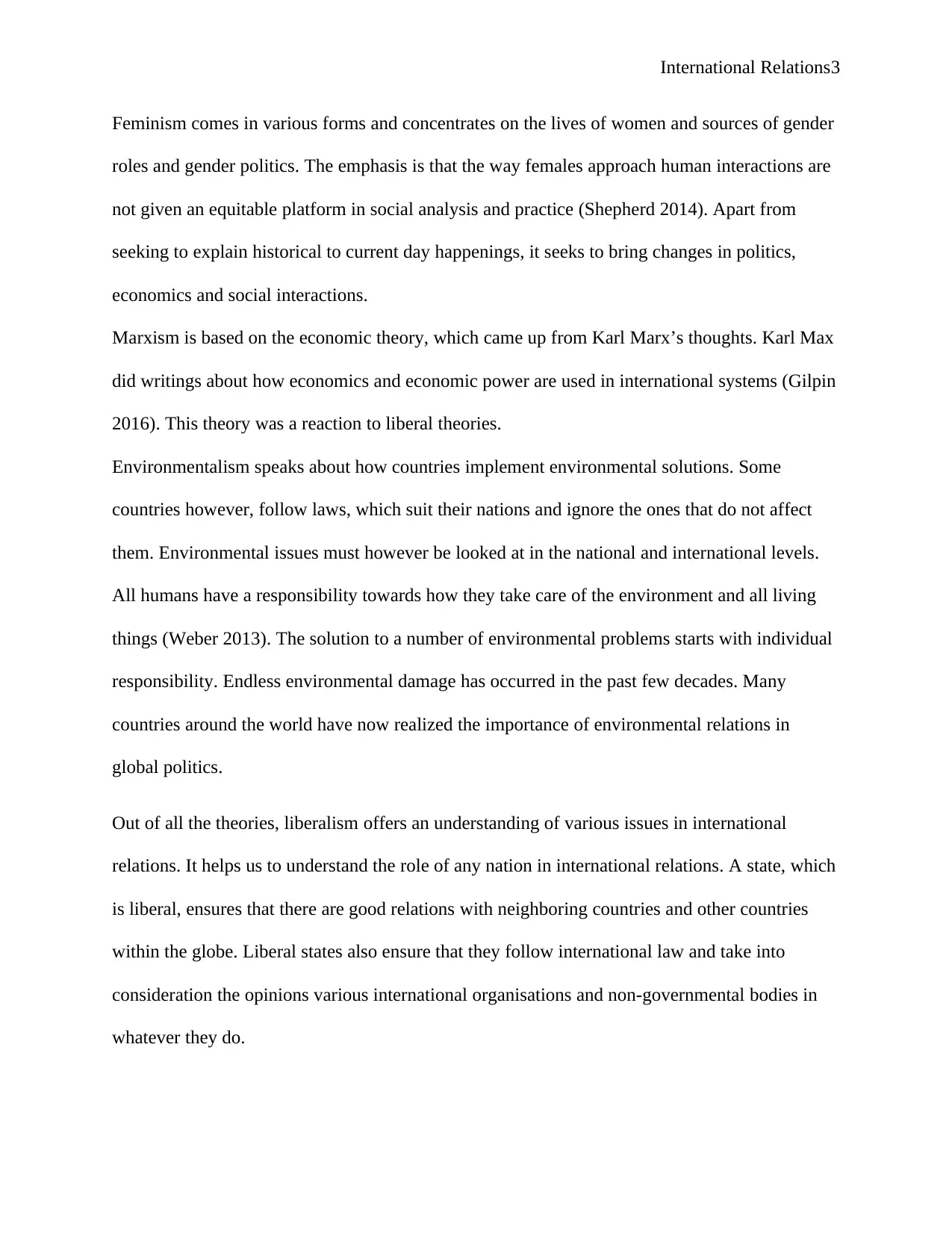
International Relations3
Feminism comes in various forms and concentrates on the lives of women and sources of gender
roles and gender politics. The emphasis is that the way females approach human interactions are
not given an equitable platform in social analysis and practice (Shepherd 2014). Apart from
seeking to explain historical to current day happenings, it seeks to bring changes in politics,
economics and social interactions.
Marxism is based on the economic theory, which came up from Karl Marx’s thoughts. Karl Max
did writings about how economics and economic power are used in international systems (Gilpin
2016). This theory was a reaction to liberal theories.
Environmentalism speaks about how countries implement environmental solutions. Some
countries however, follow laws, which suit their nations and ignore the ones that do not affect
them. Environmental issues must however be looked at in the national and international levels.
All humans have a responsibility towards how they take care of the environment and all living
things (Weber 2013). The solution to a number of environmental problems starts with individual
responsibility. Endless environmental damage has occurred in the past few decades. Many
countries around the world have now realized the importance of environmental relations in
global politics.
Out of all the theories, liberalism offers an understanding of various issues in international
relations. It helps us to understand the role of any nation in international relations. A state, which
is liberal, ensures that there are good relations with neighboring countries and other countries
within the globe. Liberal states also ensure that they follow international law and take into
consideration the opinions various international organisations and non-governmental bodies in
whatever they do.
Feminism comes in various forms and concentrates on the lives of women and sources of gender
roles and gender politics. The emphasis is that the way females approach human interactions are
not given an equitable platform in social analysis and practice (Shepherd 2014). Apart from
seeking to explain historical to current day happenings, it seeks to bring changes in politics,
economics and social interactions.
Marxism is based on the economic theory, which came up from Karl Marx’s thoughts. Karl Max
did writings about how economics and economic power are used in international systems (Gilpin
2016). This theory was a reaction to liberal theories.
Environmentalism speaks about how countries implement environmental solutions. Some
countries however, follow laws, which suit their nations and ignore the ones that do not affect
them. Environmental issues must however be looked at in the national and international levels.
All humans have a responsibility towards how they take care of the environment and all living
things (Weber 2013). The solution to a number of environmental problems starts with individual
responsibility. Endless environmental damage has occurred in the past few decades. Many
countries around the world have now realized the importance of environmental relations in
global politics.
Out of all the theories, liberalism offers an understanding of various issues in international
relations. It helps us to understand the role of any nation in international relations. A state, which
is liberal, ensures that there are good relations with neighboring countries and other countries
within the globe. Liberal states also ensure that they follow international law and take into
consideration the opinions various international organisations and non-governmental bodies in
whatever they do.
⊘ This is a preview!⊘
Do you want full access?
Subscribe today to unlock all pages.

Trusted by 1+ million students worldwide
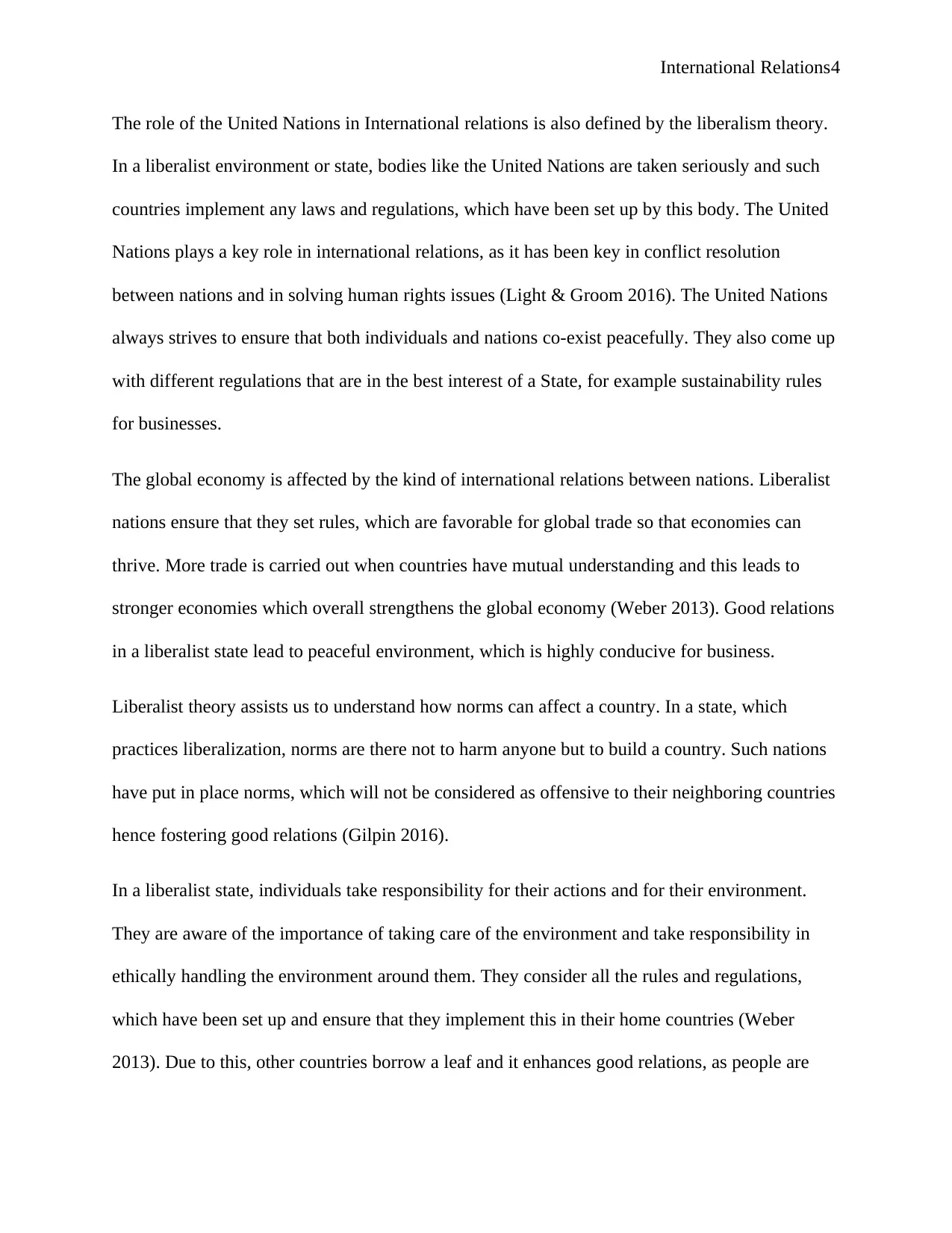
International Relations4
The role of the United Nations in International relations is also defined by the liberalism theory.
In a liberalist environment or state, bodies like the United Nations are taken seriously and such
countries implement any laws and regulations, which have been set up by this body. The United
Nations plays a key role in international relations, as it has been key in conflict resolution
between nations and in solving human rights issues (Light & Groom 2016). The United Nations
always strives to ensure that both individuals and nations co-exist peacefully. They also come up
with different regulations that are in the best interest of a State, for example sustainability rules
for businesses.
The global economy is affected by the kind of international relations between nations. Liberalist
nations ensure that they set rules, which are favorable for global trade so that economies can
thrive. More trade is carried out when countries have mutual understanding and this leads to
stronger economies which overall strengthens the global economy (Weber 2013). Good relations
in a liberalist state lead to peaceful environment, which is highly conducive for business.
Liberalist theory assists us to understand how norms can affect a country. In a state, which
practices liberalization, norms are there not to harm anyone but to build a country. Such nations
have put in place norms, which will not be considered as offensive to their neighboring countries
hence fostering good relations (Gilpin 2016).
In a liberalist state, individuals take responsibility for their actions and for their environment.
They are aware of the importance of taking care of the environment and take responsibility in
ethically handling the environment around them. They consider all the rules and regulations,
which have been set up and ensure that they implement this in their home countries (Weber
2013). Due to this, other countries borrow a leaf and it enhances good relations, as people are
The role of the United Nations in International relations is also defined by the liberalism theory.
In a liberalist environment or state, bodies like the United Nations are taken seriously and such
countries implement any laws and regulations, which have been set up by this body. The United
Nations plays a key role in international relations, as it has been key in conflict resolution
between nations and in solving human rights issues (Light & Groom 2016). The United Nations
always strives to ensure that both individuals and nations co-exist peacefully. They also come up
with different regulations that are in the best interest of a State, for example sustainability rules
for businesses.
The global economy is affected by the kind of international relations between nations. Liberalist
nations ensure that they set rules, which are favorable for global trade so that economies can
thrive. More trade is carried out when countries have mutual understanding and this leads to
stronger economies which overall strengthens the global economy (Weber 2013). Good relations
in a liberalist state lead to peaceful environment, which is highly conducive for business.
Liberalist theory assists us to understand how norms can affect a country. In a state, which
practices liberalization, norms are there not to harm anyone but to build a country. Such nations
have put in place norms, which will not be considered as offensive to their neighboring countries
hence fostering good relations (Gilpin 2016).
In a liberalist state, individuals take responsibility for their actions and for their environment.
They are aware of the importance of taking care of the environment and take responsibility in
ethically handling the environment around them. They consider all the rules and regulations,
which have been set up and ensure that they implement this in their home countries (Weber
2013). Due to this, other countries borrow a leaf and it enhances good relations, as people are
Paraphrase This Document
Need a fresh take? Get an instant paraphrase of this document with our AI Paraphraser
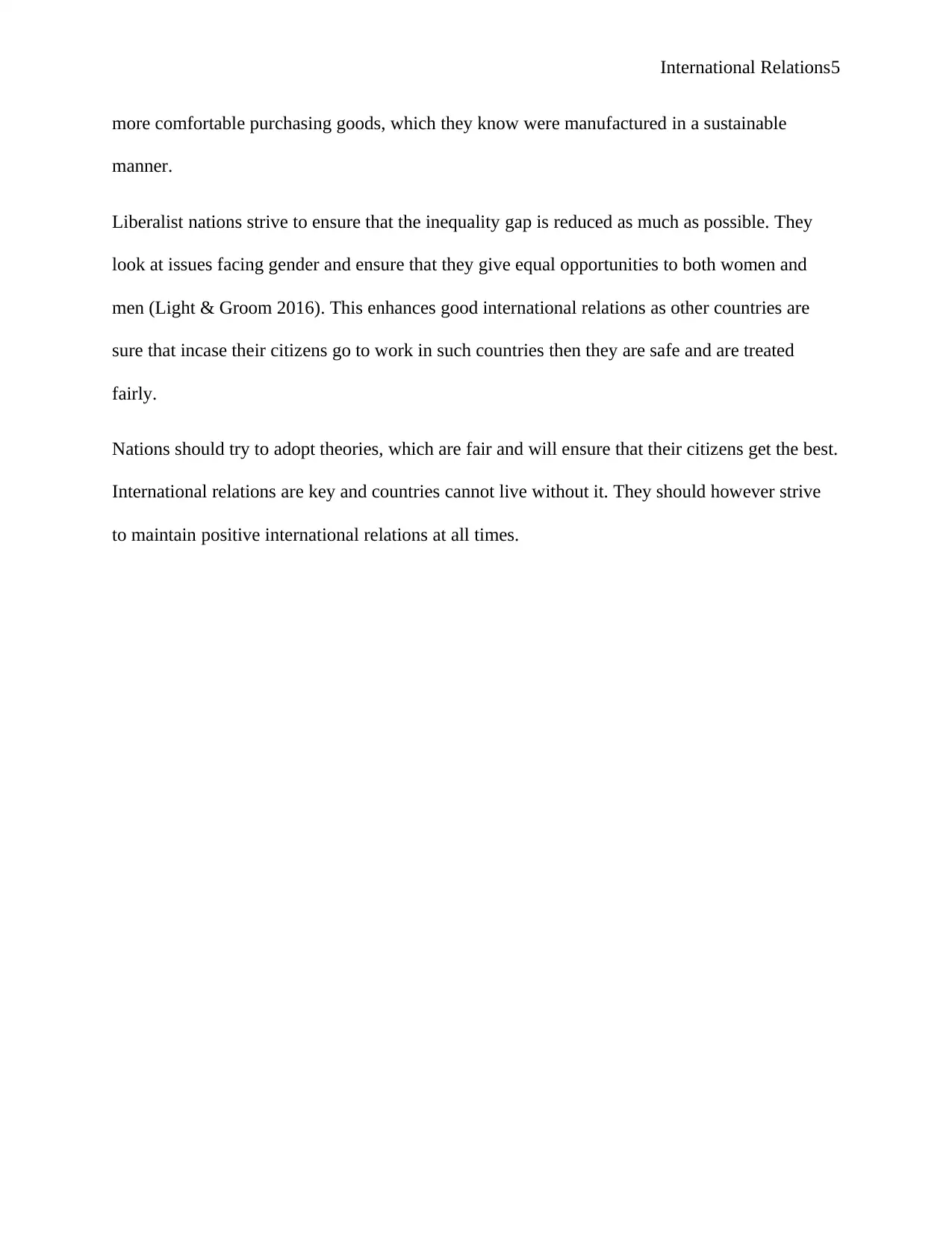
International Relations5
more comfortable purchasing goods, which they know were manufactured in a sustainable
manner.
Liberalist nations strive to ensure that the inequality gap is reduced as much as possible. They
look at issues facing gender and ensure that they give equal opportunities to both women and
men (Light & Groom 2016). This enhances good international relations as other countries are
sure that incase their citizens go to work in such countries then they are safe and are treated
fairly.
Nations should try to adopt theories, which are fair and will ensure that their citizens get the best.
International relations are key and countries cannot live without it. They should however strive
to maintain positive international relations at all times.
more comfortable purchasing goods, which they know were manufactured in a sustainable
manner.
Liberalist nations strive to ensure that the inequality gap is reduced as much as possible. They
look at issues facing gender and ensure that they give equal opportunities to both women and
men (Light & Groom 2016). This enhances good international relations as other countries are
sure that incase their citizens go to work in such countries then they are safe and are treated
fairly.
Nations should try to adopt theories, which are fair and will ensure that their citizens get the best.
International relations are key and countries cannot live without it. They should however strive
to maintain positive international relations at all times.
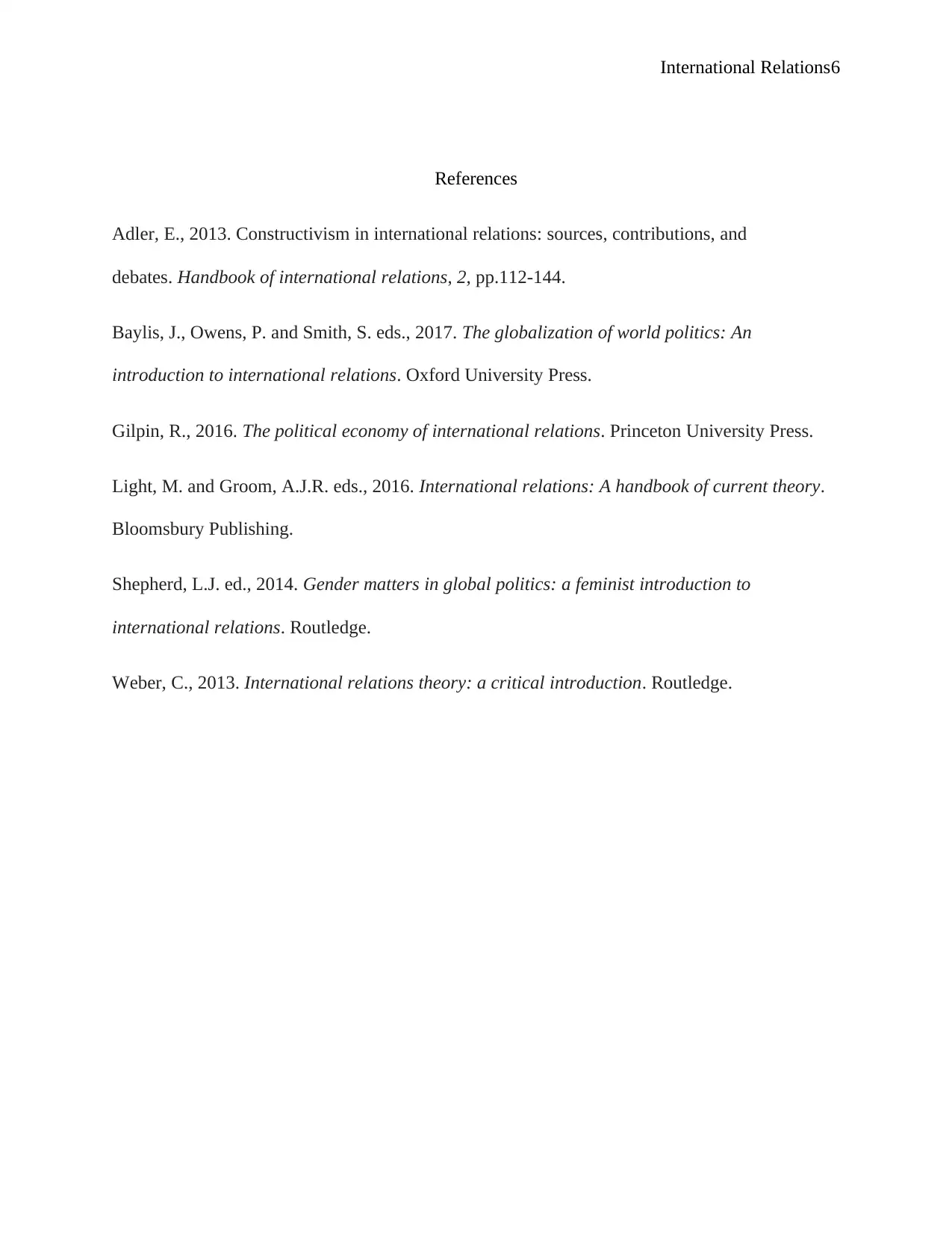
International Relations6
References
Adler, E., 2013. Constructivism in international relations: sources, contributions, and
debates. Handbook of international relations, 2, pp.112-144.
Baylis, J., Owens, P. and Smith, S. eds., 2017. The globalization of world politics: An
introduction to international relations. Oxford University Press.
Gilpin, R., 2016. The political economy of international relations. Princeton University Press.
Light, M. and Groom, A.J.R. eds., 2016. International relations: A handbook of current theory.
Bloomsbury Publishing.
Shepherd, L.J. ed., 2014. Gender matters in global politics: a feminist introduction to
international relations. Routledge.
Weber, C., 2013. International relations theory: a critical introduction. Routledge.
References
Adler, E., 2013. Constructivism in international relations: sources, contributions, and
debates. Handbook of international relations, 2, pp.112-144.
Baylis, J., Owens, P. and Smith, S. eds., 2017. The globalization of world politics: An
introduction to international relations. Oxford University Press.
Gilpin, R., 2016. The political economy of international relations. Princeton University Press.
Light, M. and Groom, A.J.R. eds., 2016. International relations: A handbook of current theory.
Bloomsbury Publishing.
Shepherd, L.J. ed., 2014. Gender matters in global politics: a feminist introduction to
international relations. Routledge.
Weber, C., 2013. International relations theory: a critical introduction. Routledge.
⊘ This is a preview!⊘
Do you want full access?
Subscribe today to unlock all pages.

Trusted by 1+ million students worldwide
1 out of 6
Related Documents
Your All-in-One AI-Powered Toolkit for Academic Success.
+13062052269
info@desklib.com
Available 24*7 on WhatsApp / Email
![[object Object]](/_next/static/media/star-bottom.7253800d.svg)
Unlock your academic potential
Copyright © 2020–2026 A2Z Services. All Rights Reserved. Developed and managed by ZUCOL.





